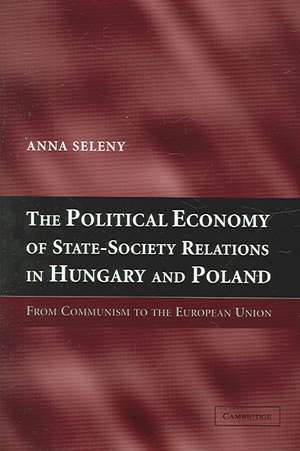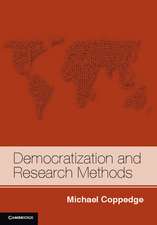The Political Economy of State-Society Relations in Hungary and Poland: From Communism to the European Union
Autor Anna Selenyen Limba Engleză Hardback – 12 feb 2006
Preț: 467.68 lei
Nou
Puncte Express: 702
Preț estimativ în valută:
89.49€ • 95.70$ • 74.62£
89.49€ • 95.70$ • 74.62£
Carte tipărită la comandă
Livrare economică 17 aprilie-01 mai
Preluare comenzi: 021 569.72.76
Specificații
ISBN-13: 9780521835640
ISBN-10: 052183564X
Pagini: 294
Ilustrații: 12 tables
Dimensiuni: 160 x 240 x 24 mm
Greutate: 0.55 kg
Editura: Cambridge University Press
Colecția Cambridge University Press
Locul publicării:New York, United States
ISBN-10: 052183564X
Pagini: 294
Ilustrații: 12 tables
Dimensiuni: 160 x 240 x 24 mm
Greutate: 0.55 kg
Editura: Cambridge University Press
Colecția Cambridge University Press
Locul publicării:New York, United States
Cuprins
1. History and theory in practice; 2. Precocious reformer: Hungary; 3. Injustice: Poland 1948–1980; 4. Poland: from solidarity to 1989; 5. Hungary: property relations recast; 6. Schumpeter by the Danube: from second economy to private sector; 7. Action and reaction: institutional consequences of private sector expansion.
Recenzii
'This is one of the best studies on the political economy of Eastern Europe published in the past decade. Seleny's work is rich in fresh insights and innovative approaches and yields a more complete understanding of policy-making and economic policies in socialist Hungary and Poland. Her focus on the political and economic significance of the second economy and its intricate relationship to state bureaucracies is particularly original. Seleny's analysis of the centrally planned economic system's lasting effects on these two new democracies and market economies.' Zoltan Barany, University of Texas
'This meticulous study conveys original and profound lessons about how states and societies become vulnerable and then change. Blending historical sweep with deep local knowledge, this book conveys the drama of the economic and political transformation in Eastern Europe in a gripping way. Seleny is masterful in showing us how much we can learn from comparative case studies.' Nancy Bermeo, Princeton University
'This is an excellent, in-depth study that explains in detail how both pre- and post- 89 history and institutions have impacted the EU accession process in Hungary and in Poland. Anna Seleny's contribution is based on research that is methodologically sound, substantively rich, and extremely well-documented. I expect the book to contribute to the important debates taking place in the social sciences about systemic transformation. The book should be of interest to a broad, interdisciplinary audience beyond political science, since it links political, economic and cultural developments.' János Kornai, Collegium Budapest
'[T]he main thrust of this valuable study adds considerably to an understanding of what, in the biography of Hungarian and Polish socialism, accounts for the strikingly different way state and society met, tangled, and evolved in the two countries, and with what implications for the new era.' Foreign Affairs
' … Seleny's book has much to offer, particularly on the evolution of the Hungarian economic, political and economic system.' Slavonic and East European Review
'This meticulous study conveys original and profound lessons about how states and societies become vulnerable and then change. Blending historical sweep with deep local knowledge, this book conveys the drama of the economic and political transformation in Eastern Europe in a gripping way. Seleny is masterful in showing us how much we can learn from comparative case studies.' Nancy Bermeo, Princeton University
'This is an excellent, in-depth study that explains in detail how both pre- and post- 89 history and institutions have impacted the EU accession process in Hungary and in Poland. Anna Seleny's contribution is based on research that is methodologically sound, substantively rich, and extremely well-documented. I expect the book to contribute to the important debates taking place in the social sciences about systemic transformation. The book should be of interest to a broad, interdisciplinary audience beyond political science, since it links political, economic and cultural developments.' János Kornai, Collegium Budapest
'[T]he main thrust of this valuable study adds considerably to an understanding of what, in the biography of Hungarian and Polish socialism, accounts for the strikingly different way state and society met, tangled, and evolved in the two countries, and with what implications for the new era.' Foreign Affairs
' … Seleny's book has much to offer, particularly on the evolution of the Hungarian economic, political and economic system.' Slavonic and East European Review
Notă biografică
Descriere
This book shows how Hungary and Poland led the transformations that brought down Communism.











